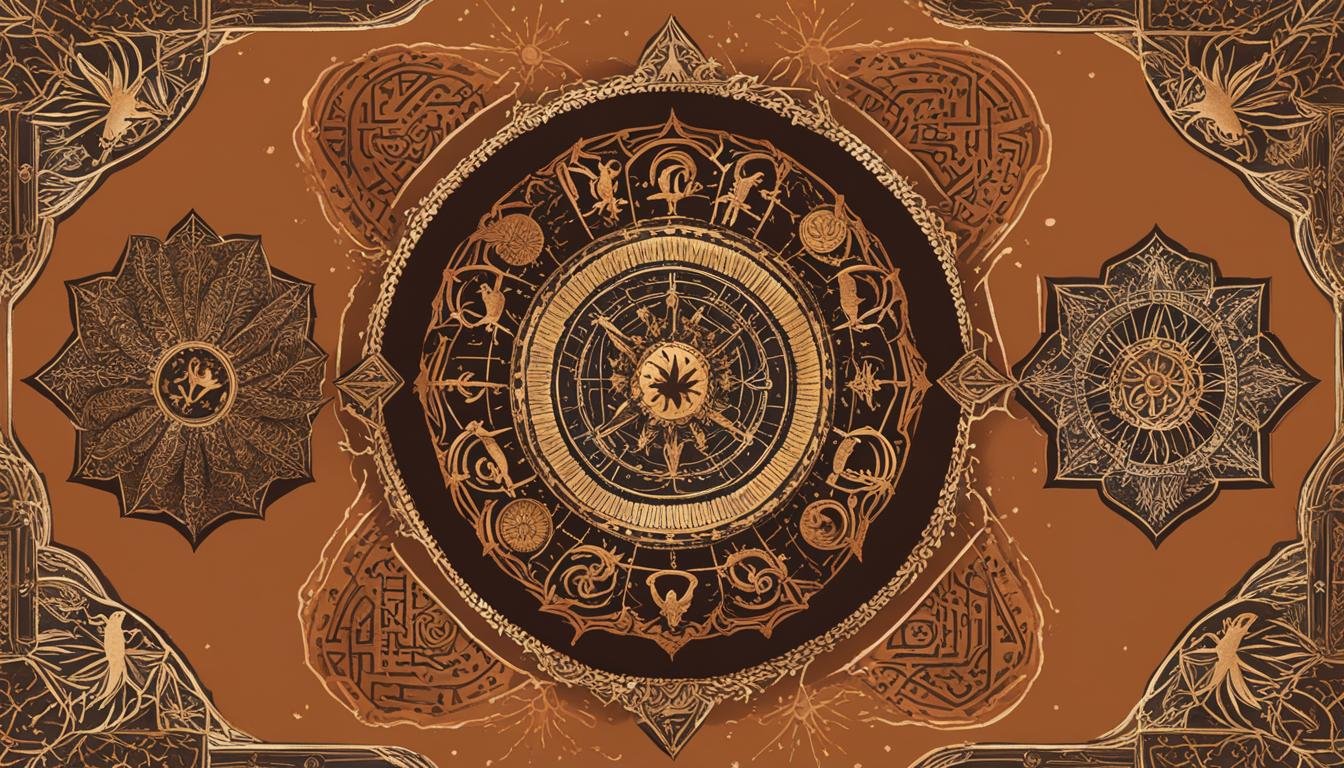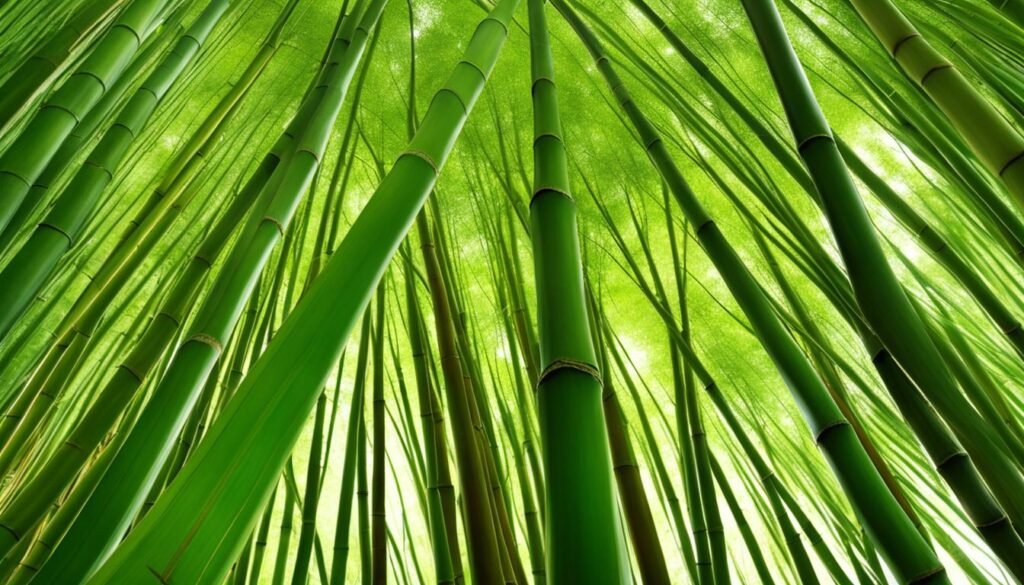Greetings, astrology enthusiasts! Today, I am excited to delve into the fascinating realm of cactus symbolism in astrology. While cacti may not be the first plants that come to mind when we think about astrological significance, their unique characteristics and energy can offer valuable insights into our astrological journey.
Contrary to popular belief, cacti are not merely prickly plants that bring negative energy. In fact, when placed in the right location, cacti can serve as powerful protectors for our homes, guiding us towards positivity and harmony.
Key Takeaways:
- Cacti have astrological significance and can offer valuable insights into our spiritual journey.
- Contrary to popular belief, cacti can serve as powerful protectors when placed in the right location.
- Understanding the symbolism of cacti in astrology can enhance our understanding of ourselves and our surroundings.
- Exploring the meaning and significance of cacti in astrology opens up new avenues for self-reflection and personal growth.
- Join me as we unravel the captivating world of cactus symbolism in astrology!
The Negative Vastu Plants to Avoid
When it comes to Vastu, the ancient Indian practice of harmonizing your surroundings with positive energy flow, certain plants are considered negative and should be avoided. These plants carry unfavorable energies that can disrupt the balance and harmony in your home.
One such plant to avoid is the cactus. Known for its sharp thorns, cacti are believed to bring misfortunes and cause stress and anxiety within the family. The prickly nature of cactus symbolizes negative energy, making it an unsuitable choice for your home according to Vastu.
Other plants that are considered negative in Vastu include bonsai, cotton plant, mehendi (myrtle) plant, and dead plants. These plants may also attract negative energy and disrupt the positive flow in your space.
To maintain a positive energy flow in your home, it is advised to avoid keeping these negative Vastu plants. By eliminating these plants from your living space, you can create a more harmonious and balanced environment.
The Role of Cactus in Vastu
While cactus is generally considered a negative plant in vastu, it can serve as a protector against negative energies when placed in the right location. Placing cactus on the terrace or by the window can help fight the negative energy that may be trying to flow into the home. It acts as a barrier and safeguards the home from misfortunes.

When strategically placed, cactus can create a shield against negative influences and provide a sense of security and protection in your living space. Its sharp spines act as a defense mechanism, guarding your home against harm.
According to vastu principles, the ideal placement for cactus as a protector in vastu is near entrances, especially doors and windows, as these are the main points from where negative energies may enter. The prickly nature of cactus is believed to repel negativity and ward off evil spirits.
It is important to note that while cactus can have positive effects in vastu, it is essential to avoid placing cacti in bedroom or kitchen areas as these are considered inappropriate due to the potential disturbance they may cause. Instead, focus on positioning them in open areas where negative energies may gather.
Positive Cactus Placement in Vastu:
- Near entrances to repel negative influences
- On the terrace or by windows to act as a barrier against misfortunes
- In open areas to discourage the accumulation of negative energies
When used wisely, cactus can transform from a negative plant in vastu to a protector against negative energies, creating a harmonious and secure environment in your home.
By understanding the symbolism and energy dynamics of plants like cactus in the context of vastu, you can optimize the positive influences in your living space and create a balanced and auspicious environment.
| Placement | Benefits |
|---|---|
| Near entrances | Repels negative energies and evil spirits |
| By windows or on the terrace | Protects against misfortunes and negative influences |
| In open areas | Discourages the accumulation of negative energies |
Toxic and Poisonous Plants to Avoid
In addition to negative vastu plants, there are also plants that can be toxic and harmful to humans and animals. It is important to be aware of these toxic plants and avoid having them in our homes or gardens to ensure the safety of our loved ones, including our furry friends.
Lilies: Lilies are not only beautiful flowers but also highly toxic to cats. Even a small ingestion of lilies can cause severe kidney damage and, in some cases, can be fatal for our feline companions. It is best to keep lilies out of our homes if we have cats or consider opting for cat-friendly floral alternatives.
Sago Palm: Sago palms are popular ornamental plants, but their seeds are extremely toxic to both humans and pets if ingested. The seeds contain cycasin, a toxic compound that can cause liver failure, seizures, and even death. If we have small children or pets at home, it is wise to avoid keeping sago palms to ensure their safety.
Dumb Cane: Dumb cane, also known as Dieffenbachia, is a common houseplant with beautiful leaves. However, all parts of this plant contain calcium oxalate crystals, which can cause severe irritation and swelling of the mouth and throat if chewed or ingested. It is essential to keep dumb cane away from children and pets who may be curious and prone to exploring their environment.
English Ivy: English ivy is a popular climbing vine that adds a touch of elegance to our homes. However, it is toxic to both humans and pets if consumed. Ingesting English ivy can lead to digestive issues, skin irritation, and even respiratory problems in sensitive individuals. It is wise to keep English ivy out of reach and opt for non-toxic alternatives for greenery in our homes.
Toxic and Poisonous Plants
| Plant | Toxicity | Effects |
|---|---|---|
| Lilies | Toxic to cats | Kidney damage, potential fatality |
| Sago Palm | Highly toxic | Liver failure, seizures, potential fatality |
| Dumb Cane (Dieffenbachia) | Moderate toxicity | Mouth and throat irritation, swelling |
| English Ivy | Moderate toxicity | Digestive issues, skin irritation, respiratory problems |
It is crucial to educate ourselves about the potential dangers of toxic plants and take necessary precautions. If we suspect ingestion of a toxic plant or observe any unusual symptoms in ourselves, our children, or our pets, it is important to seek immediate medical attention or consult a veterinarian.
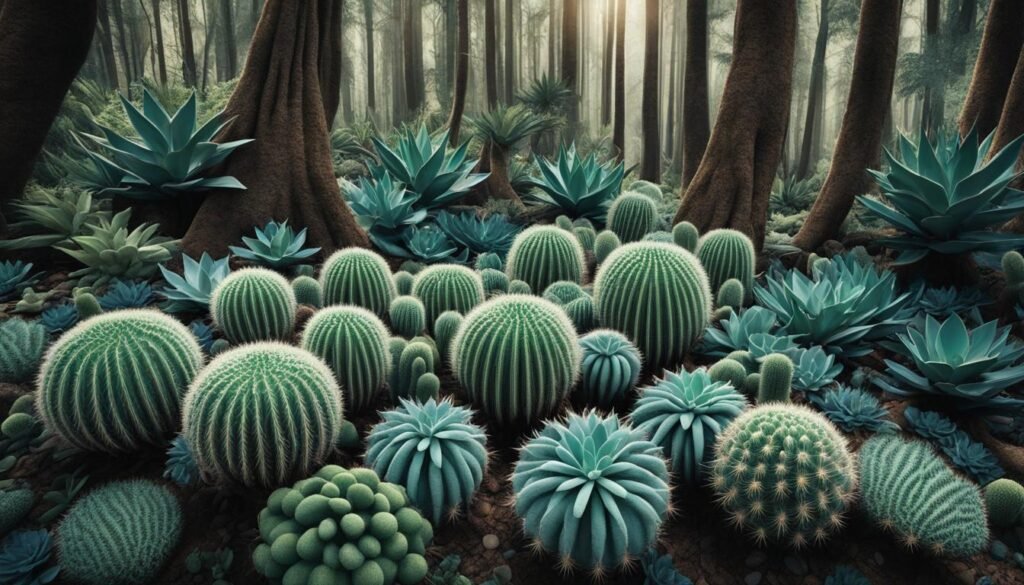
Tips for Dealing with Negative Plants as per Vastu
When it comes to negative plants in vastu, it’s important to handle them with caution and take the necessary steps to minimize any potential negative effects. Here are some tips to help you deal with inauspicious plants and care for good vastu plants:
- If you are unsure about the toxicity or negativity of a plant, it’s best to avoid consuming any part of it and keep it away from pets and children.
- Keep the space around good vastu plants clutter-free to attract positive energies. Removing any unnecessary objects or debris from their surroundings will help maintain a harmonious environment.
- Regular care and maintenance of plants are essential to ensure a positive energy flow in your home. This includes watering them adequately, providing sufficient sunlight, and pruning any dead or dying parts of the plants.
- Consider consulting a professional or expert in Vastu Shastra for specific guidance on dealing with negative plants and creating a positive environment in your home.
Remember, by following these tips and taking proactive measures, you can create a more conducive environment for positive energy and enhance the overall harmony in your living space.
By implementing these practices and being mindful of the plants you choose to keep in your home, you can maintain a positive energy flow and enjoy the benefits of good vastu plants.
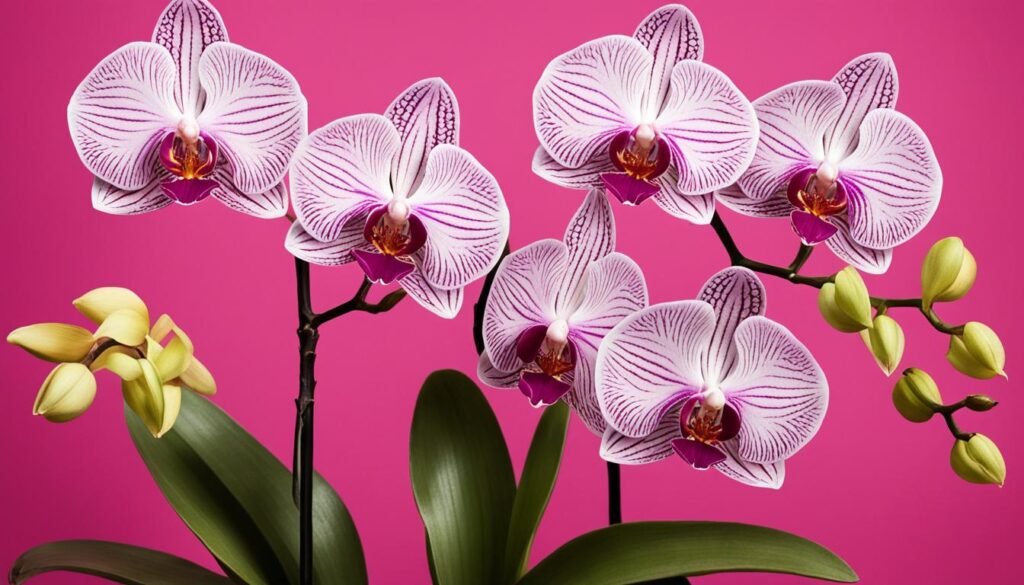
Orchid Characteristics
- Strong and resilient
- Thrives in a variety of conditions
- Exudes elegance and beauty
- Symbolizes strength, power, and grace
“Orchids are a perfect match for the ambitious and confident Aries individuals. Their strength and resilience are reflective of the determined nature of Aries, while their beauty adds a touch of elegance to their surroundings.”
Orchids are not just visually stunning, but they also possess qualities that resonate with the pioneering spirit of Aries. Just like Aries individuals, orchids have the ability to adapt and thrive in various environments. They can effortlessly tackle challenges and overcome obstacles, making them the ideal match for the entrepreneurial nature of Aries.
Whether it’s their captivating appearance or their symbolism of beauty and strength, orchids are the perfect companion for Aries individuals who are driven by ambitious goals and a desire to make their mark on the world.
Taurus and Cacti: Stability and Practicality
Taurus individuals are known for their stability and practicality, making them a perfect match for cacti. Cacti are resilient plants that can thrive in dry and desert conditions, making them well-suited for the practical and patient nature of Taurus.
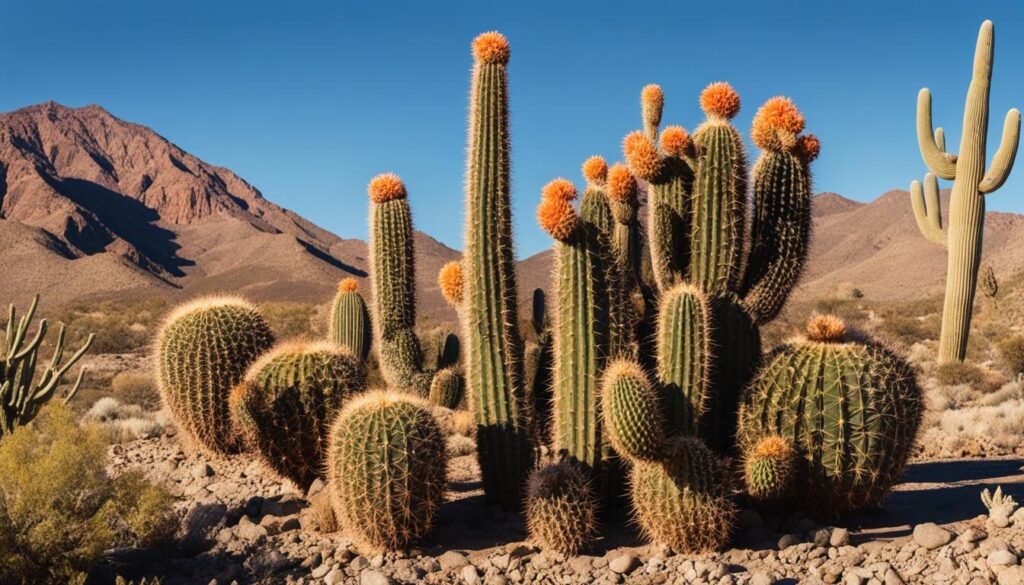
Cacti require minimal water and love the sun, making them low-maintenance companions for Taurus. Just as Taurus individuals are grounded and steadfast, cacti are known for their ability to thrive in harsh environments and adapt to challenging conditions.
The symbolic significance of cacti is also highly relevant to the Taurus personality. Cacti are often associated with endurance, resilience, and strength. Just like the Taurus, cacti have the ability to weather any storm and stand tall amidst adversity.
“Like the sturdy and reliable cactus, Taurus individuals remain steadfast and practical in all aspects of life.”
The characteristics of cacti mirror the personality traits of Taurus individuals. Both are known for being practical, patient, and reliable. Taurus individuals, like cacti, have a strong sense of stability and can handle any situation with calm and composure.
Key Characteristics of Cacti:
- Resilient and adaptable to harsh environments
- Require minimal water and sunlight
- Symbolize endurance, resilience, and strength
Taurus Personality Traits:
- Practical and down-to-earth
- Patient and reliable
- Stable and consistent
The symbolism and characteristics of cacti align perfectly with the personality traits of Taurus individuals, making them an ideal match. Just as Taurus individuals provide a strong and stable presence in their relationships and endeavors, cacti bring a touch of resilience and practicality to any space they inhabit.
Gemini and Philodendron: Adaptability and Diversity
Gemini, known for their adaptability and diversity, are best matched with philodendron.
Philodendron, with its plethora of species, perfectly aligns with the ever-changing nature of Gemini. This versatile plant offers nearly 500 unique varieties, each with its own distinct growth methods and leaf styles. From the vibrant and heart-shaped leaves of Philodendron hederaceum to the striking foliage of Philodendron gloriosum, the philodendron family thrives in diverse environments – just like Gemini.
“Philodendron symbolizes the ability to adapt and flourish in a range of situations, making it the perfect plant companion for Gemini, who effortlessly embraces change.”
Whether placed as a hanging vine, potted plant, or climbing creeper, philodendron adapts itself to various settings and adds a touch of natural beauty to any space. Its leaves vary in color, shape, and texture, encompassing an array of shades from deep greens to vibrant burgundies and even variegated patterns. This diversity reflects the multifaceted nature of Gemini, who effortlessly navigates different environments and thrives in versatility.
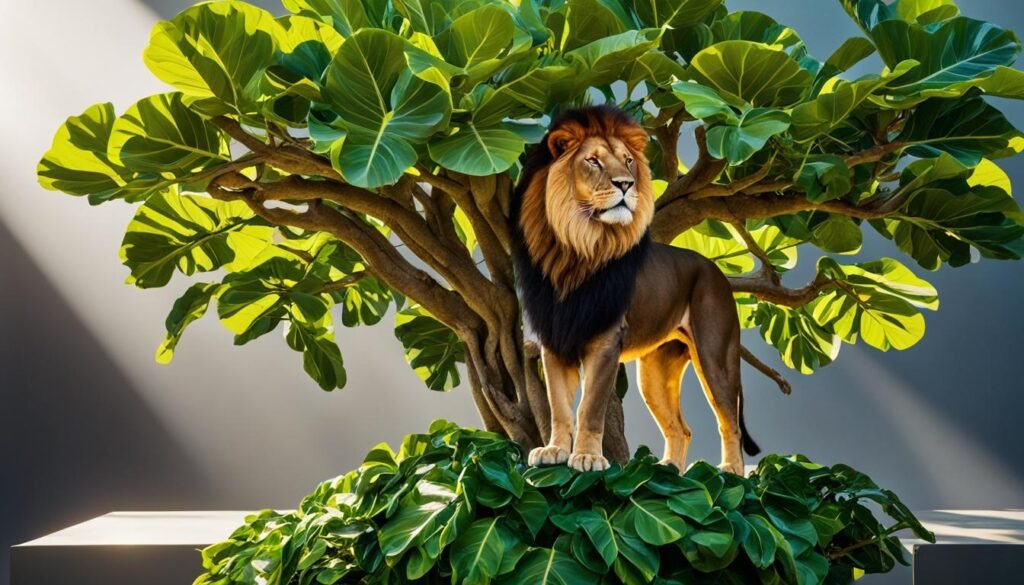
Fiddle-leaf Fig Tree Symbolism
The fiddle-leaf fig tree is associated with elegance, sophistication, and artistic expression. Its large, lush leaves resemble the shape of a violin or fiddle, hence the name. This symbolism resonates with the Leo’s inclination towards creativity, as they have a natural flair for expressing themselves artistically.
Fiddle-leaf Fig Tree Characteristics
The fiddle-leaf fig tree is characterized by its bold and striking appearance. Its large, glossy leaves in vibrant shades of green create a visual impact and command attention. The tree itself can grow tall, adding height and drama to any space. This reflects the Leo’s love for being the center of attention and their ability to captivate others with their magnetic personality.
Leo Personality Traits
Leo individuals are known for their confident and charismatic nature. They possess a natural charm that draws people towards them and can effortlessly take the lead in any situation. Leos have a flair for the dramatic and enjoy being in the spotlight. They thrive on creativity and self-expression, often showcasing their artistic abilities in various forms. This perfectly aligns with the fiddle-leaf fig tree’s symbolism and characteristics, making it an ideal match for Leos.
| Leo Personality Traits | Fiddle-leaf Fig Tree Characteristics |
|---|---|
| Confident | Bold and striking appearance |
| Charismatic | Large, glossy leaves that command attention |
| Dramatic | Tall growth adds height and drama |
| Creative | Elegant and sophisticated symbolism |
Virgo and Aloe Vera Plant: Practicality and Healing
As a Virgo, I appreciate practicality and attention to detail in all aspects of life, including my choice of plants. When it comes to finding the perfect plant companion for a Virgo, the aloe vera plant stands out as an excellent match. Aloe vera plants are not only decorative but also highly functional, making them an ideal addition to any home, particularly in the kitchen or bathroom.
The aloe vera plant’s unique characteristics perfectly align with the organized and health-conscious nature of Virgos. With its edgy spike style and thick, fleshy leaves, the aloe vera plant brings a touch of elegance and practicality to any space. Its sleek appearance adds a modern and minimalist aesthetic to a room, creating an atmosphere of simplicity and sophistication.
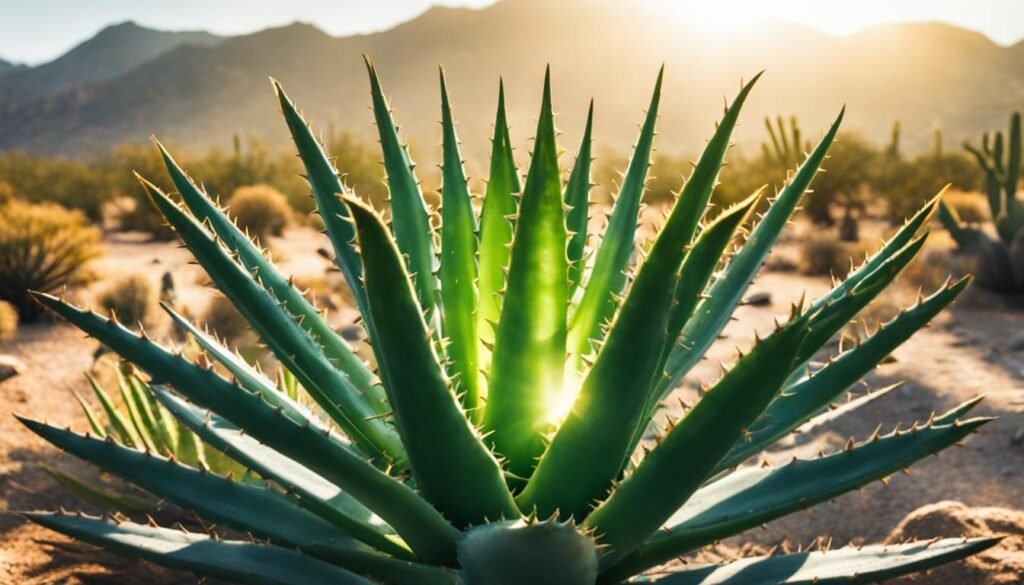
Aloe vera plants are not only visually appealing but also offer numerous benefits. Renowned for their healing properties, aloe vera plants have been used for centuries to treat a variety of ailments. The gel inside the leaves can be applied topically to soothe minor burns, cuts, and skin irritations. It’s like having a natural first-aid kit right at your fingertips.
Additionally, aloe vera plants improve indoor air quality by releasing oxygen and absorbing harmful toxins, creating a fresh and healthy living environment. It’s no wonder that these plants are often referred to as “nature’s air purifiers.”
In summary, the aloe vera plant is a practical and healing companion for Virgos. Its sleek appearance, low-maintenance nature, and medicinal properties make it an excellent choice for those who appreciate both aesthetics and functionality. Incorporating an aloe vera plant into your home not only adds a touch of greenery but also promotes a sense of well-being and harmony.
Conclusion
In astrology, plants hold significant meaning and interpretation, reflecting their unique characteristics and associations with various zodiac signs. By delving into the symbolism of plants, we gain valuable insights into their astrological significance and the role they play in cultivating positive energy and ambiance within our homes. Whether we are steering clear of negative plants as advised by vastu or embracing auspicious plants for their positive vibrations, incorporating plants into astrology allows us to establish harmony and equilibrium in our lives.
Plants have deep-rooted symbolism in astrology, reflecting the traits and qualities associated with each zodiac sign. By understanding the characteristics and symbolism of specific plants, we can harness their energies to enhance our lives. For instance, Aries individuals, known for their entrepreneurial spirit, can benefit from the strength and elegance symbolized by orchids. Taurus, on the other hand, with their practicality and stability, find solace in the resilience and low-maintenance nature of cacti.
From Gemini’s adaptability represented by the diverse philodendron to Cancer’s nurturing nature aligned with the serene and air-purifying peace lilies, each zodiac sign finds a plant that resonates with their unique qualities. Leo individuals, with their creative flair and penchant for the limelight, are drawn to the dramatic and grandiose fiddle-leaf fig tree. Virgo’s attention to detail and practicality align perfectly with the versatile and healing properties of the aloe vera plant.
By incorporating plants into astrology, we tap into their symbolic essence and enrich our lives with positive energy. Whether it’s cactus astrology interpretation or understanding the significance of plants in astrology, embracing these botanical allies allows us to create a harmonious sanctuary where balance and positive vibrations thrive.
FAQ
What is the significance of cactus in astrology?
In astrology, cactus represents stability and practicality, making it a perfect match for the Taurus zodiac sign. Cacti are resilient plants that thrive in arid conditions, reflecting the grounded and patient nature of Taurus.
Are cacti considered negative plants in Vastu?
Yes, according to Vastu, cacti are considered negative plants to have at home. The sharp thorns on their leaves are believed to carry negative energies that can bring misfortunes, stress, and anxiety to the family.
Can cacti be beneficial in Vastu if placed correctly?
Yes, when placed in the right location, cacti can actually be beneficial in Vastu. Placing cactus on the terrace or by the window acts as a barrier against negative energy flow, protecting the home from misfortunes.
Are there any toxic plants that should be avoided at home?
Yes, there are several toxic plants that should be kept away from humans and animals. Lilies, sago palm, dumb cane, and English ivy are examples of plants that can cause harm if ingested.
How should negative plants be handled as per Vastu?
To deal with negative plants in Vastu, it is advised to avoid keeping them at home. Regular care and maintenance of plants, including removing dead or dying ones, are essential to maintain a positive energy flow in the home.
What trees should be avoided near the property according to Vastu?
According to Vastu, tamarind trees are believed to prevent the growth of family members and cause illness if planted in the house garden. Date palm trees are associated with financial hardships, while bamboo trees are considered morbid as they are used at the time of death in India.
Are there any lucky plants for a positive home as per Vastu?
Yes, there are several lucky plants according to Vastu. Tulsi or holy basil, money plant or pothos, neem tree, banana plant, and lotus plant are believed to bring positive energy and good fortune to the home.
What are some plants associated with each zodiac sign?
Each zodiac sign is associated with different plants based on their characteristics and symbolism. For example, Aries is associated with orchids, Taurus with cacti, Gemini with philodendron, Cancer with peace lily, Leo with fiddle-leaf fig tree, etc.
What plant represents Aries in astrology?
Aries is represented by orchids in astrology. Orchids symbolize beauty, strength, and elegance, which align with the confident and ambitious nature of Aries.
Which plant is associated with Taurus in astrology?
Taurus is associated with cacti in astrology. Cacti embody stability and practicality, reflecting the grounded and patient nature of Taurus.
Which plant represents Gemini in astrology?
Gemini is represented by philodendron in astrology. Philodendron is a diverse plant with almost 500 species, reflecting the adaptable and ever-changing nature of Gemini.
What plant is associated with Cancer in astrology?
Cancer is associated with peace lilies in astrology. Peace lilies symbolize purity and tranquility, aligning with the nurturing and emotional nature of Cancer.
Which plant represents Leo in astrology?
Leo is represented by fiddle-leaf fig trees in astrology. Fiddle-leaf fig trees have grandiose leaves and make a statement in any room, reflecting the dramatic and confident nature of Leo.
What plant is associated with Virgo in astrology?
Virgo is associated with aloe vera plants in astrology. Aloe vera plants are practical and have healing properties, reflecting the practicality and attention to detail of Virgo.
